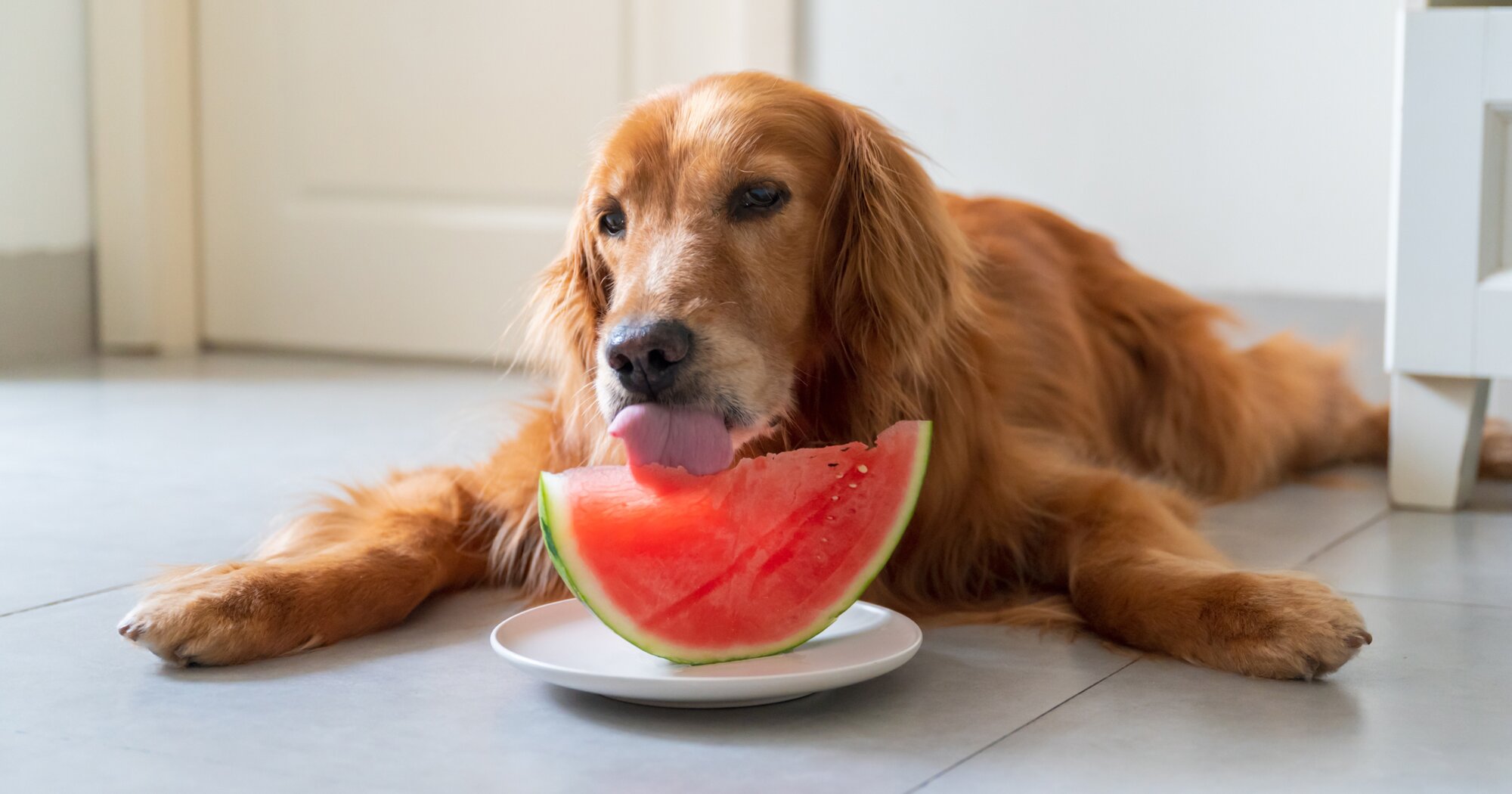While fruits are a popular, healthy snack for humans, you may wonder, "What fruits can dogs eat?" The truth is, there are some fruits that are safe for dogs. And, there are ways dog parents can use fruits to prepare a healthy treat for their pet.
In this article, we'll cover whether or not dogs can eat fruit, which fruits are safe for dogs to eat, and which ones to avoid. Plus, fun ways to incorporate fruit into your dog’s diet.

Can dogs eat fruit
Fruit can add nutritional value to your dog's meals. And, pet parents can use fruits to make a tasty treat for their pup.
Every dog is different, and some dogs may not like fruits and vegetables. When introducing fruit to your dog's diet, start with small amounts to avoid an upset stomach.
How much fruit can dogs eat
Even though fruits have nutritional value, it's important to give fruit to your dog in moderation. If a dog eats too much fruit, it can cause stomach upset.
VET TIP
Talk to your veterinarian before adding fruit to your dog's diet.
16 fruits dogs can eat
Any fruits fed in high amounts can cause an upset stomach in dogs. When feeding your dog fruit, be sure you only give them small bite-sized pieces every so often.
1. Apples

Apples are a low-calorie fruit. Apples have vitamin C and A. Remove the core, stem, and seeds before giving apple slices to your dog. Apple seeds contain a small amount of cyanide that could harm your pup.
2. Bananas

Bananas are good sources of potassium, vitamin B6, vitamin C, fiber, and magnesium. But, bananas are high in sugar and starch, which can hurt your dog's stomach if fed in large quantities. Banana peels aren't toxic to dogs, but they can cause an intestinal blockage if eaten whole.
3. Blueberries

Blueberries are rich in anti-inflammatory properties and make for a safe and healthy treat for dogs. Fresh or frozen, blueberries are fruits dogs can eat.

4. Coconut

Fresh coconut is safe for dogs to eat. And, coconut oil can be beneficial for your dog’s skin and coat. Avoid giving your dog sweetened coconut, as its high sugar content is dangerous to your dog’s health.
Coconut is a sweet treat that pet parents should only give their pups in moderation. Too much coconut in one sitting can cause an upset stomach.
5. Cranberries

Dried and fresh cranberries are safe for dogs in small quantities. Cranberries may help with urinary tract issues in dogs. Add a small amount of dried or fresh cranberries to your dog's meal to boost their health. But, be sure to remove any seeds from fresh cranberries before feeding your pup.
6. Cucumbers

Cucumbers are a low-calorie snack and are great for overweight dogs. Plus, cucumbers are a healthy treat that can help keep your dog cool and hydrated in the heat.
7. Mango

Mangoes are full of vitamins and minerals including vitamin C, vitamin A, vitamin B-6, and potassium. Remove the hard pit of the mango before giving any to your pup. The pit is a choking hazard and has a small amount of cyanide, which is toxic to dogs.
8. Melon

Melons have vitamin C and A and are mostly water. This makes them a great treat for hydration on warm summer days. Like other fruits, dogs should only have melon in small amounts.
For example, cantaloupe contains fiber, vitamin C, and potassium, making it a healthy snack for dogs. But, cantaloupes have high amounts of sugar, so only feed them to your dog occasionally.
9. Oranges

Oranges contain a high amount of vitamin C and are also rich in fiber. Too much fiber can hurt your dog's stomach.
Your dog can safely eat oranges in small quantities. But, you should only feed them to your dog on occasion. Avoid feeding your dog other citrus fruits like lemons.
10. Peaches

Fresh peaches contain antioxidants and vitamins that can boost your dog's immune system. But, avoid giving your dog canned peaches, as the syrup has too much sugar. Remember to remove the peach pit, as it is a dangerous choking hazard for dogs.
11. Pears

Similar to apples, pears are nutritious and have vitamins A and C. Remove pear seeds and avoid canned pears with sugar syrup.
12. Pineapple

Pineapple is a tropical fruit that supports your dog's digestion and immune system. When feeding your dog pineapple, peel off the skin and cut it into small pieces to avoid choking.
13. Pumpkin

Pumpkin is great for dogs suffering from digestive issues like constipation and diarrhea. Pumpkin can be fed to dogs canned or dehydrated.
Fresh pumpkin is also okay, but contains less fiber and nutrients. Canned pumpkin is more nutrient-dense because the cooking and canning process concentrates the pumpkin pulp.
14. Raspberry

Like many fruits, dogs can eat raspberries in moderation and as an occasional treat. But, a large amount of raspberries can make your dog's stomach upset.
To avoid giving your pup too many seeds, try mashing and spreading raspberries on a lick mat. Pick out the seeds and leave the rest of the raspberry for your pup to enjoy.
15. Strawberries

Strawberries are not only high in fiber and vitamin C, but they also have enzymes that may help keep your dog's teeth clean. They can also be high in sugar, so only give your dog a few small pieces at a time.
16. Watermelon

Watermelon is one of the best options for safe fruits dogs can eat. Small pieces of watermelon are great for hydration and antioxidants. Just be sure to remove the rind, seeds, and skin before you safely feed your dog watermelon.
5 fruits to avoid in your dog's diet
While there are plenty of fruits that are safe for dogs, not all fruits are good for your dog's health. Here's a list of fruits that you should never feed your dog.
1. Avocado
The skin, leaves, and stem of avocado fruit contain persin, a substance that is toxic to dogs. Plus, the pit of an avocado is a choking hazard. While the flesh (the green part) of an avocado is safe for your dog, it’s best to skip feeding your dog avocados.
2. Cherries
Cherry pits have traces of cyanide, which is toxic to dogs. If your dog swallows one by accident, don't fret. But, if they chew the pit, it may release the cyanide and make your dog sick.
3. Grapes
Grapes and raisins are very toxic to dogs. And, grape seed extract is toxic to dogs. Even one grape or raisin can be fatal or cause sudden kidney failure in dogs.
4. Tomatoes
While tomatoes themselves aren't bad for dogs, the green parts of the tomato plant contain solanine, which is toxic to dogs. It's best to skip tomatoes to avoid stomach upset.
5. Fruit snacks
While most fruits are on the table, can dogs eat fruit snacks? The answer is no. Dogs should not eat fruit snacks because they are high in sugar. Humans eat fruit snacks, and fruit snacks may contain other ingredients that are toxic to dogs.
VET TIP
If your dog accidentally eats a fruit that isn't safe for dogs, watch for signs of poisoning and bowel obstruction. Visit your veterinarian for a dog check-up if any symptoms arise.
Ways to feed your dog fruit
There are many ways to add fruit to your dog's diet. The good news is that adding fruit to your dog's meals is simple. Use these tips to put a fun spin on your dog's meal times and training sessions.
Make a lick mat
Cut and mash citrus fruits, bananas, blueberries, and peanut butter onto a lick mat. You can give it to your dog to enjoy fresh or put it in the freezer for an added challenge.
Add fruit to meals
Dog owners can cut up small pieces of fruit and sprinkle them on top of their dog's meal. Adding fruit can boost the nutritional value of your dog's meals. Plus, it's a tasty treat for your dog.
Freeze fruit into a pup-sicle
Cut fruits safe for dogs into small pieces and place them into a popsicle mold. Add water, and put the molds into the freezer for a few hours. Pop out the pup-sicles and give a few to your dog in the summer heat for a cool snack.
Use fruit for trick training
Small pieces of fruit can be high-value rewards for trick training. While practicing tricks, give your dog a few small pieces of fruit to keep them interested.
While there are many fruits that are safe for dogs to eat, it's important to know which ones are healthy and which are dangerous. Overall, safe fruits for dogs make for a great snack and nutritious treat. 

